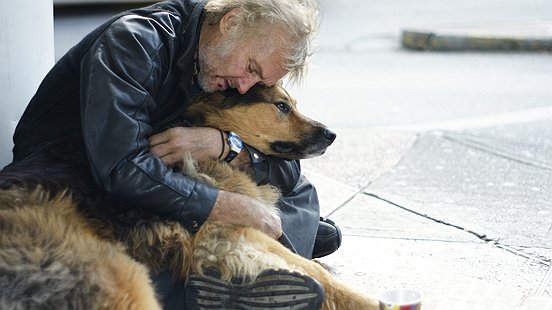“If you care so much about refugees, why don’t you take one into your home?”
Selective Empathy: Why We Weep for Dogs But Not Refugees
By Sean Ash
I can’t ignore the painful irony in a society where a traumatised animal is more likely to be welcomed into a home than a traumatised human being.
I’m not comparing the worth of a refugee and a dog. I’m holding up a mirror to selective empathy, and asking an uncomfortable but important question: Why is a traumatised dog more welcome than a traumatised person?
We’ve all seen the slogans of the past, “No Irish. No Blacks. No Dogs.”
And today we hear a modern repeat from the far-right:
“If you care so much about refugees, why don’t you take one into your home?”
But that’s a false dichotomy.
No one is asking you to take a refugee into your house.
They’re not moving into your spare room, they’re moving into your country, like countless others before them.
We don’t ask that level of personal sacrifice when it comes to any other form of public need, so why do we ask it only when it’s about offering safety to strangers?
The implication, of course, is that refugees are dangerous, ungrateful, unclean. That they’d destroy your house. Harm your children. Cost you peace.
But strangely, these same people will happily take in a dog from unknown circumstances, often traumatised, untrained, sometimes aggressive, without demanding a full psychological profile or character reference. They give the animal time, patience, and love. They see potential. They see innocence. They see value.
We took our dog in when he was four years old. He wasn’t a puppy. We didn’t raise him from birth. He had his habits, his flaws, his ways. He made mistakes. But with time, he became family. He softened. We bonded. And when he died last week, I cried. Because he was part of me. Because something sacred had passed through my life and left a space I still can’t fill. People often forget, as much as a dog might have that effect, a human life can equally touch your life in many ways.
It’s like the homeless. Most times, people are more likely to give donations to a rough sleeper when they see a dog with them. They feel more empathy for the animal. Yet in other circumstances, when refugees are helped, these same people suddenly find a voice for our homeless, as if they really cared. Do we ask them, “Why don’t you take in and home a fellow Englishman?” I’m sure you already know the answer to that one.
I’m not saying we shouldn’t have empathy for dogs.
But if you can only find empathy for an animal and not for a fellow human being, it doesn’t make you a good person. It makes you a hypocrite. You might argue, “it’s not a dogs fault they are in that position”, is it the fault of the refugee for being in theirs?
This isn’t about comparing lives.
It’s about asking: Why are we more willing to show compassion to an animal than to a human in need?
What does that say about us?
When we choose who is deserving of kindness, of safety, of home, we reveal the truth about our values.
And right now, too many seem willing to show love to a dog, but not to other human beings simply because they’ve been labelled ‘refugees’. I guess it’s similar to when they tell you which breed of dogs are good and bad. Some food for thought.



Comments
Post a Comment